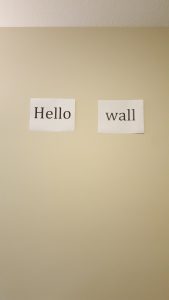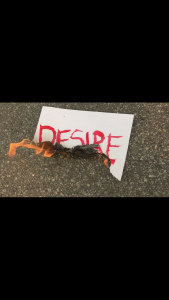
Assignment two – Joy Kogawa
Beaton Assignment 2
Blake Beaton
Kedrick James
LLED 445
August 8, 2017
Poetry is often enigmatic, but rarely is the the mystery of a poem’s figurative language both stylistic and didactic. The poem “Metaphors” by Sylvia Plath uses metaphorical imagery that increasingly depicts a coherent theme within the poem. The poem’s opening line reveals the speaker’s intention to perplex the reader by creating a metaphor comparing the speaker to a “riddle,” after which several very perplexing objects are compared to the speaker: “An elephant, a ponderous house,/ [and] A melon strolling on two tendrils.” The connection between the three objects is at first unclear, though the first two suggest that the speaker is of great size, while the third suggests that the speaker walks on two legs but that a disparity exists between her torso and lower limbs. The varied use of image continues in a perplexing pattern as the speaker exclaims, “O red fruit, ivory, fine timbers!” none of which have obvious parallels to previous images with perhaps the exception of “fine timbers” which are slender in the same fashion as plant tendrils. At this point in the poem, the speaker references an object that is “big with its yeasty rising,” suggesting growth, and continues on to suggest the creation of something new in the line, “Money’s new-minted in this fat purse.” Until this point, the metaphorical images of the poem have been cryptic, though as the poem comes to a close their continued use becomes slightly more accessible.
While the poem appears to be inaccessible, the final three lines reveal a theme in which the speaker is describing herself as a pregnant woman. The words, “I’m a means,” suggest that the speaker is a vehicle through which something else is accomplished, and the words “a cow in calf” are a common idiom denoting a pregnant cow (though the speaker’s meaning of “a stage” is ambiguous as the word may denote numerous things). As the speaker continues with the line, “I’ve eaten a bag of green apples,” the numerous connections between fruit and the distended belly of a pregnant woman become clearer, and the poem’s final line “[I’ve] [b]oarded the train there’s no getting off,” suggests a necessary and unavoidable term of waiting for the woman. It is likely in the final three lines of the poem that most readers begin to make the connections between its earlier images, the poem’s initial line, and its title, thereby coming to see that metaphors are a way of using words that express something literally untrue but also a way of communicating meaning through implicit comparison. The poem has the potential to teach its readers that metaphors are like riddles in that meaning must be inferred using as many of the available and readily understandable meanings that surround it. Ultimately, however, the poem also serves to educate the reader as to the dangers of using metaphors in a context that makes it too difficult for the writer to express an intended meaning.
“Metaphors” by Sylvia Plath
I’m a riddle in nine syllables,
An elephant, a ponderous house,
A melon strolling on two tendrils.
O red fruit, ivory, fine timbers!
This loaf’s big with its yeasty rising.
Money’s new-minted in this fat purse.
I’m a means, a stage, a cow in calf.
I’ve eaten a bag of green apples,
Boarded the train there’s no getting off.
Proxy Poem:
Riddle
I am that which is sought but unfound,
A vestige of what guides your sages.
A gnarled and broken awen of crystal
That shattered lies in art and power.
Aletheia in time’s dark lethe
Forgotten in Promethian’ gift,
Banished from souls and minds by rabble
I lay in darkness despite my light.
Seek me, find me, and uncover the…
Alternative Medium – “A Burning Desire”
 – Eddy
– Eddy
The Hugest Pit
he
b
a
c
k
s
l
i
d
and felt the slow, fragile realization of his mistake
Choose
This Life
In the
D
E
P
T
H
S
of grief
whispered delicately
~ CG
Assignment 2
Remix Renga poem
Slither
Crashes right beside the hugest
Thing that creates the bookworm along with the tea
Then lead slippery, oily, coily worm
Slimy like a newborn centipede.
Turtles are slow.
Hence, they win races.
Tiresome Teachers assign poems on love
Under trees, in times of trouble.
There’s that place that I wondered why I so rarely visited.
“Don’t get robbed,”
The mother exclaimed
Move superlative then comparative.
I begin to sense something of nonsense in this poem, hence…
Alternative Medium Poem

– Hannah
B.Ed. BUC
Within the mists of time
a father betroth his daughter to the hugest man in the village
The man was black hearted and fierce.
He was evil, sadistic and cold in his fierceness
It bit me like a delicious spider-monkey
Because I bit it first.
My sister is young. Yet she is knowledgeable.
Growing into an Empire State building
Out of the frying pan and into the fire it went
“Where there were no onlookers”
He concluded
We float on the rocks.
More buoyant then them,
quite contented with their matrimony.
REMIX RENGA POEM
The hugest beast sat alongside his buddy
And it all became suddenly crystal clear
He found the absolutely beautiful meaning of the pile of rotting brussel sprouts that is life.
Tossed into the compost with even a second thought, for the racoons to enjoy in the evening.
Life can be shitty!
Nevertheless, it goes on.
But nothing goes on at the temperamental UBC warehouse of the mind- neither upside down nor inside out. Found itself in the middle of stacks of whiskey bottles who awaited to their promises.
“I’m bloody wasted” they shouted.
More wasted than garbage From last week!